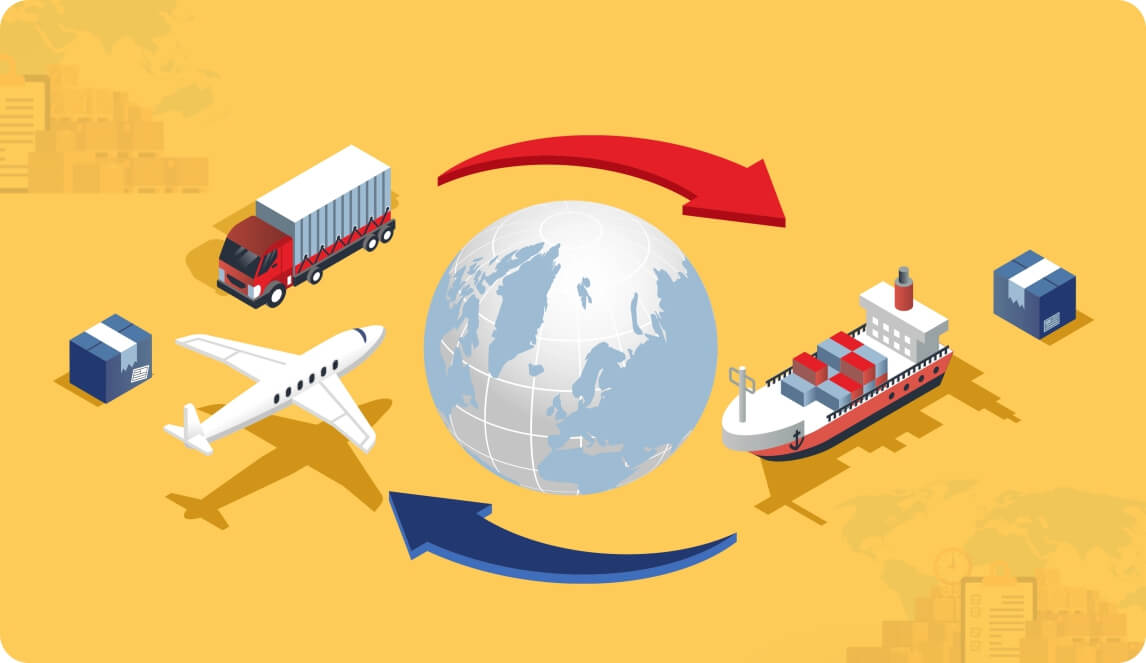Get in touch


Import-Export Business: A Complete Guide for Shipping from India to Germany
June 17, 2025
Chaitanya

India and Germany are stringing together a fruitful bilateral relationship. And these ties have benefitted businesses from both nations. The trade between the two nations reached USD 26.10 billion in FY 2023-24. These numbers make Germany India's biggest trading partner in Europe, making shipping from India to Germany a lucrative business.
Germany has imported goods from India worth USD 9.83 billion during FY 2023-24. The products leading the charts were machinery, textiles, chemicals, and auto components.
Thus, in the upcoming years, the relations between the two nations are only going to get better and better, presenting a great opportunity for Indian businesses to showcase their quality and skills.
However, exploring and entering into the market of Germany isn't an easy job. Entrepreneurs and businesses looking to import from India to Germany must understand the nuances of shipping from India to Germany. It includes knowing the steps of the import-export process, understanding customs regulations, preparing documentation, managing logistics and many more.
If you think managing all these would be an overload, then worry no more! This blog covers everything that you need to know about import-export business with Germany. This is the ultimate India to Germany shipping guide
So, let's deep dive into the details!
-
Secure an Import Export Code (IEC)
If you want to indulge in any import and export activity in India, then you need the IEC, a 10-digit code issued by the Directorate General of Foreign Trade (DGFT).
How can you apply for it? You need to submit your documents, including your Aadhaar card, PAN card, and bank details. The details are available on the DGFT portal.
It will take around one week to process all the details.
-
Register with Export Promotion Councils (EPCs)
It is a good idea to register with the respective EPC as per your product category. The registration can open doors to knowing market insights and networking opportunities. EPCs also come in handy when you need some guidance about compliance with EU regulations.
-
Understand German and EU Regulations
Germany adheres to strict EU import regulations,, and there are no cutting corners here. The rules are extremely stringent, especially for products like chemicals, electronics, and food items.
Hence, make sure you comply with standards like CE Marking for electronics or phytosanitary certificates for agricultural goods. Go through the list of prohibited items to ensure you don't get stuck with customs issues. Generally, items such as aerosols, explosives, and fragile goods like glass or ceramics come under this category.
You can check the website of the German Customs Authority (www.zoll.de ). The website provides detailed guidelines for all products.
-
Prepare Export Documentation
Having your paperwork in order is a big win when it comes to import-export of products. Because accurate documentation facilitates smooth customs clearance. Otherwise, you will end up paying fines or facing delays. Some of the essential documents include:
- Commercial Invoice: The invoice must contain the details of the sale, should have a thorough product description, the value of the products, and buyer information.
- Packing List: This list describes the shipment contents, weight, and dimensions.
- Bill of Lading/Airway Bill: This bill acts as a contract between the shipper and carrier.
- Certificate of Origin: Verifies the goods’ Indian origin, impacting tariff rates.
- Shipping Bill: Filed electronically with Indian customs for export clearance.
-
Choose a Shipping Method
There are several options available to ship products from India to Germany. You can select the best option based on your requirements:
- Ocean Freight: If you are sending large shipments and want a cost-effective option, then choose ocean freight. It has options such as Full Container Load (FCL) and Less than Container Load (LCL). You can select the best based upon your shipment size.
- Air Freight: Faster but more expensive option. So choose it when you need to send products urgently or have high-value or time-sensitive goods.
- India Post: This works as a budget-friendly option for small parcels. But it comes with certain limitations and may not have all features and services that other logistics companies provide.
-
Partner with a Reliable Shipping Provider
Choosing a trusted logistics partner will simplify the entire process for you. Platforms like Atlantic International Express offer low freight rates, real-time tracking, and door-to-door delivery.
Freight forwarders also provide assistance to manage logistics and paperwork, ensuring compliance.
-
Optimize for German Consumers
German consumers prioritize quality, transparency, and sustainability. So if you want to win their hearts, then you must focus on these aspects.
It is a good idea to provide detailed product information to your customers and at appropriate forums. Make sure to respond to reviews and receive feedback with empathy and professionalism.
You can also consider offering free shipping for orders above €150 to acquire customer trust and to build credibility.
Investing in eco-friendly packaging and compliance with the German Packaging Act can go a long way in enhancing the appeal of your products. Also, partnering with local distributors can also increase your market reach.
-
Some Common Challenges and Solutions
Germany is a great market for import-export business. But it does present certain challenges. Here are a few ways you can navigate through these challenges:
- High Shipping Costs: This is a common challenge. You can overcome it by choosing a logistics partner with clear pricing and no hidden costs. You can also compare rates before zeroing in on your logistics partner.
- Complex Regulations: You can choose a logistics partner that offers assistance to handle customs. This will make your work easy.
- Market Competition: You can attend German trade fairs and showcase your products and build connections.
Partner With Atlantic to Excel in Import-Export
Exporting from India to Germany offers great potential for businesses of all sizes. By choosing Atlantic, you get to enjoy fast and reliable shipping services.
We have years of experience and have solid expertise in shipping to Germany. So connect with us today to establish a strong presence in Germany’s vibrant market. With thorough preparation and strategic partnerships, your import-export journey can be both profitable and seamless.
FAQs
Germany, India’s largest European trading partner, imported USD 9.83 billion in goods like machinery and textiles in FY 2023-24, offering significant opportunities.
Essential documents include a Commercial Invoice, Packing List, Bill of Lading/Airway Bill, Certificate of Origin, and Shipping Bill for customs clearance.
Options include ocean freight (FCL or LCL) for large shipments, air freight for urgent or high-value goods, and India Post for small, budget-friendly parcels.
Ensure compliance with EU standards like CE Marking, phytosanitary certificates, and the German Packaging Act, and check prohibited items on www.zoll.de.
Choose a logistics partner with transparent pricing, compare rates, consolidate shipments, and use eco-friendly packaging to align with German preferences.


